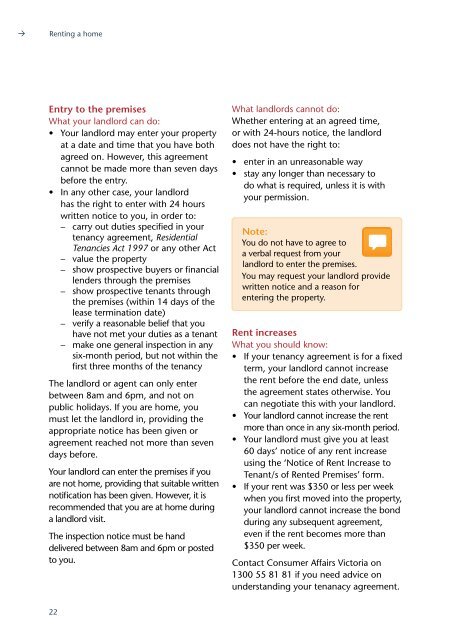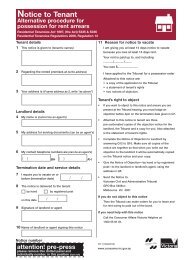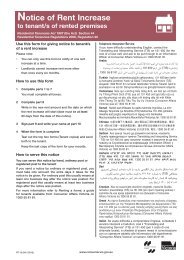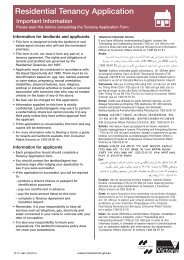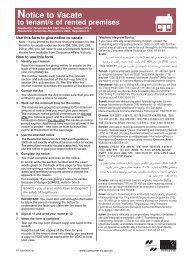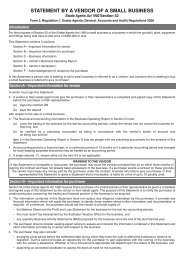Renting a home: a guide for tenants - Consumer Affairs Victoria
Renting a home: a guide for tenants - Consumer Affairs Victoria
Renting a home: a guide for tenants - Consumer Affairs Victoria
You also want an ePaper? Increase the reach of your titles
YUMPU automatically turns print PDFs into web optimized ePapers that Google loves.
<strong>Renting</strong> a <strong>home</strong><br />
Entry to the premises<br />
What your landlord can do:<br />
• Your landlord may enter your property<br />
at a date and time that you have both<br />
agreed on. However, this agreement<br />
cannot be made more than seven days<br />
be<strong>for</strong>e the entry.<br />
• In any other case, your landlord<br />
has the right to enter with 24 hours<br />
written notice to you, in order to:<br />
– carry out duties specified in your<br />
tenancy agreement, Residential<br />
Tenancies Act 1997 or any other Act<br />
– value the property<br />
– show prospective buyers or financial<br />
lenders through the premises<br />
– show prospective <strong>tenants</strong> through<br />
the premises (within 14 days of the<br />
lease termination date)<br />
– verify a reasonable belief that you<br />
have not met your duties as a tenant<br />
– make one general inspection in any<br />
six-month period, but not within the<br />
first three months of the tenancy<br />
The landlord or agent can only enter<br />
between 8am and 6pm, and not on<br />
public holidays. If you are <strong>home</strong>, you<br />
must let the landlord in, providing the<br />
appropriate notice has been given or<br />
agreement reached not more than seven<br />
days be<strong>for</strong>e.<br />
Your landlord can enter the premises if you<br />
are not <strong>home</strong>, providing that suitable written<br />
notification has been given. However, it is<br />
recommended that you are at <strong>home</strong> during<br />
a landlord visit.<br />
The inspection notice must be hand<br />
delivered between 8am and 6pm or posted<br />
to you.<br />
22<br />
What landlords cannot do:<br />
Whether entering at an agreed time,<br />
or with 24-hours notice, the landlord<br />
does not have the right to:<br />
• enter in an unreasonable way<br />
• stay any longer than necessary to<br />
do what is required, unless it is with<br />
your permission.<br />
Note:<br />
You do not have to agree to<br />
a verbal request from your<br />
landlord to enter the premises.<br />
You may request your landlord provide<br />
written notice and a reason <strong>for</strong><br />
entering the property.<br />
Rent increases<br />
What you should know:<br />
• If your tenancy agreement is <strong>for</strong> a fixed<br />
term, your landlord cannot increase<br />
the rent be<strong>for</strong>e the end date, unless<br />
the agreement states otherwise. You<br />
can negotiate this with your landlord.<br />
• Your landlord cannot increase the rent<br />
more than once in any six-month period.<br />
• Your landlord must give you at least<br />
60 days’ notice of any rent increase<br />
using the ‘Notice of Rent Increase to<br />
Tenant/s of Rented Premises’ <strong>for</strong>m.<br />
• If your rent was $350 or less per week<br />
when you first moved into the property,<br />
your landlord cannot increase the bond<br />
during any subsequent agreement,<br />
even if the rent becomes more than<br />
$350 per week.<br />
Contact <strong>Consumer</strong> <strong>Affairs</strong> <strong>Victoria</strong> on<br />
1300 55 81 81 if you need advice on<br />
understanding your tenanacy agreement.


